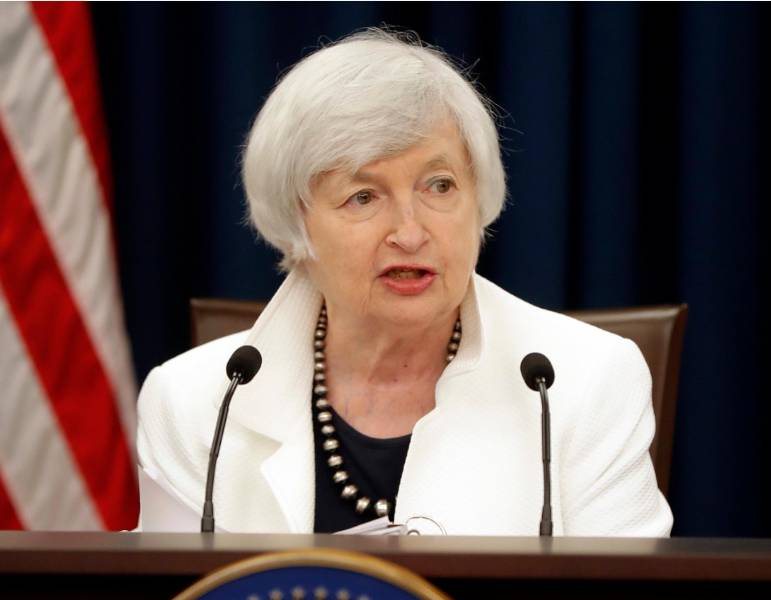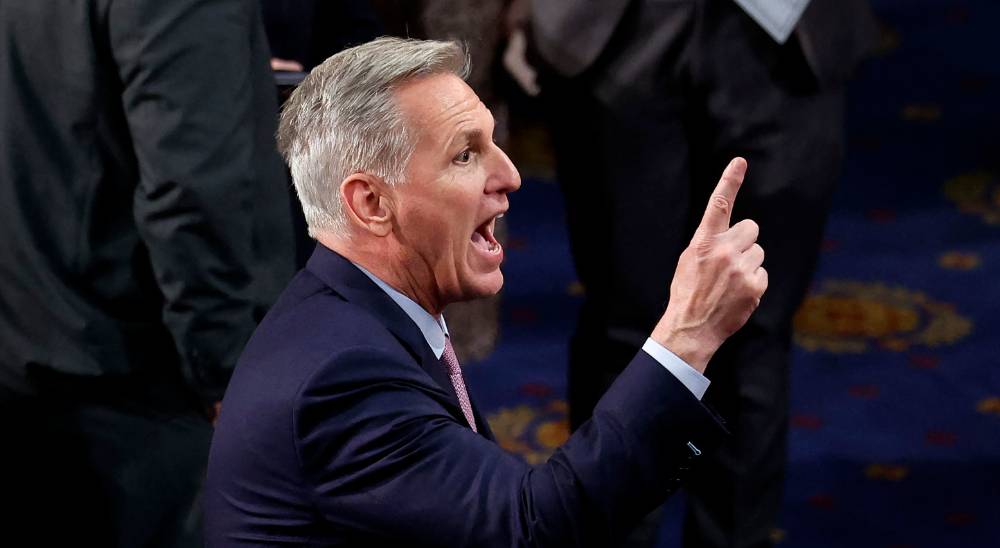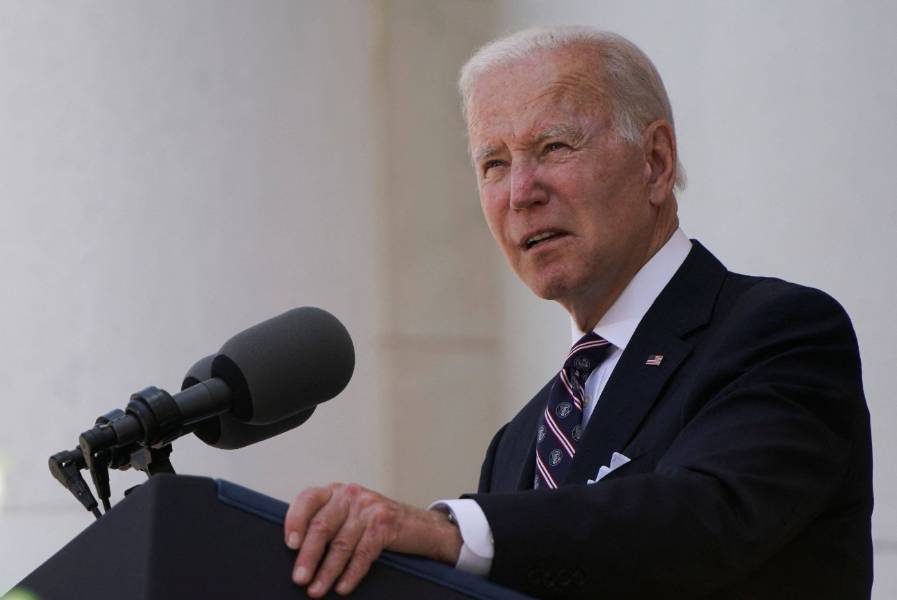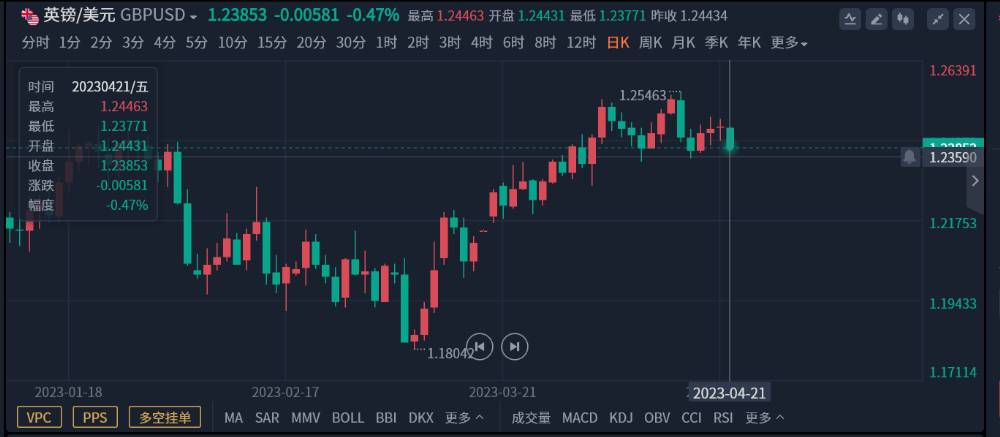Gold again approaches $2,000 mark Yellen says debt ceiling issue will trigger "economic disaster"
On April 25, U.S. Treasury Secretary Yellen said in a meeting with California business executives that if Congress fails to adjust the federal government's debt ceiling to lead to a default on its debt, it will trigger an "economic disaster" that will lead to higher interest rates in the coming years.。
Recently, the performance of U.S. stocks have "thunder," the U.S. debt ceiling issue is deadlocked.。
Yellen calls on Congress to raise or suspend the debt ceiling "unconditionally" McCarthy hits back hard
On April 25, U.S. Treasury Secretary Yellen (Janet Yellen) said in a meeting with California business executives that if the U.S. Congress fails to adjust the federal government's debt ceiling to lead to a default on its debt, it will trigger an "economic catastrophe" (economic catastrophe), leading to higher interest rates in the next few years.。

Yellen said a debt default would lead to a permanent rise in borrowing costs, and future investment costs could become more expensive。In addition, a debt default would result in a credit-deteriorating market environment for U.S. economic agents, and the government may not be able to disburse payments to military families and seniors who rely on Social Security.。
Finally, Yellen reiterated her call for Congress to raise or suspend the debt ceiling "unconditionally" immediately and without delay.。
In fact, the size of the U.S. federal government debt reached 31 on January 19..$4 trillion statutory debt ceiling。The U.S. Treasury Department began unconventional measures on Jan. 19 to avoid a default on government debt.。Yellen has previously said that unconventional measures will help the federal government meet its obligations up until early June.。At the time, analysts estimated that the federal government could rely on cash reserves and borrowing capacity to survive until the third or fourth quarter of this year, the so-called "X-Date."。
However, after the release of the annual U.S. tax data, the market began to worry。Data show that as of April 18, the deadline for annual U.S. tax returns, the U.S. Treasury recorded a total tax revenue of 1,298.$200 million, with total deposits in the Fed's Treasury General Account at 2,835.$300 million, with a balance of 2,525 at the end of the day..$500 million, worse than expected。There is a view that weak taxes could weaken the federal government's ability to pay its debts, bringing "X-Date" early.。
And Congress is not without effort。Last week, House Speaker Kevin McCarthy (Kevin McCarthy) unveiled a 2023 bill called Limit, Save, Grow, which plans to raise the federal government's debt ceiling by another 1.$5 trillion, or an extension of the debt ceiling moratorium until the end of March 2024, and calls on the Biden administration to negotiate。
McCarthy, a Republican, also noted that the bill would limit government spending, cutting the federal budget to 2022 levels while limiting future spending increases to 1 percent per year.。In addition, the bill would cut 4 percent over the next decade..$5 trillion budget deficit and make this bill "the basis for negotiations in the coming weeks"。
In response, the White House says raising the debt ceiling and cutting government spending are not to be confused。On the congressional side, the Democratic-controlled Senate may also reject the proposal。
It can be seen that the negotiations have not yet started, the smell of gunpowder between the two parties has been burning more and more intense, and McCarthy this time seems to be "sure" that the opponent has been cornered, will be its harsh bill "obediently submit."。On April 26, he strongly stated that a bill to raise the debt ceiling would be passed this week and would not be changed or reopened.。

Underlying the debt ceiling issue is a bipartisan dispute that could spread if the crisis occurs, with global gold exceeding $2,000 in a day.
In fact, behind the U.S. debt ceiling issue, there is often a partisan issue in the U.S.。The two parties brought the "donkey-elephant dispute" to the mediation between the federal government and Congress to make the issue so intractable.。In this crisis, there are only slightly more Republican seats in Congress than Democratic seats, and it may be more difficult to reach consensus between the two than before.。
In addition, the United States will usher in another presidential election year next year。On April 25, Biden, a Democrat, had announced his re-election bid and pointed the finger at so-called Republican extremists, believing that he would not easily back down on the U.S. debt ceiling.。After all, if an agreement is finally reached to "suspend the debt ceiling extension," the issue will be postponed directly to the second quarter of next year.。By then, in the middle of a presidential election year, it's hard to guarantee that Republicans won't "fire a gun" at Biden with this issue.。

JPMorgan said earlier that a similar impact could be economically disastrous and potentially damaging for investors, and that if history is any guide, the bipartisan compromise in the U.S. Congress is expected to be short-lived.。
Over the past decade, the U.S. government and Congress have repeatedly brokered and confronted the debt ceiling issue in an effort to fully resolve it before it hit the market, mostly with "loud thunder and little rain."。However, in August 2011, Republicans and Democrats had been at loggerheads over the issue until the last minute of the default deadline, when the U.S. House of Representatives passed a plan to raise the U.S. debt ceiling to reduce the fiscal deficit.。
At the time, the two parties were slow to agree, the market had serious doubts about the U.S. government's ability to work together to solve its fiscal problems, the dollar began to sell off, stocks fell, credit spreads widened, risk assets reacted negatively, and Standard & Poor's downgraded the U.S. long-term credit rating from AAA to AA +。This incident shows that while the debt ceiling issue can be contained for most of the time, if negotiations are delayed and the crisis spreads or is about to spread to markets, it will cause panic among investors and have a significant impact on the financial environment.。
Some analysts believe that if the debt crisis does occur, there will be a large amount of capital flight in the U.S. domestic capital markets, funds will flow from the U.S. mainland to international assets and foreign government bonds, the remaining market funds will also flow to high-quality bonds, and U.S. Treasury rates will fall.。Since then, starting with the U.S. stock market being hit, the crisis will gradually spread worldwide, causing foreign investors to lose confidence in U.S. debt.。
As U.S. debt is considered one of the safest financial assets in the world, the collapse of U.S. debt beliefs will profoundly affect the global financial system。David Kelly, chief global strategist at JPMorgan Asset Management, said a default on U.S. debt could leave some lasting trauma and the cost of financing federal government debt could permanently increase in the future.。
By the U.S. debt default crisis continued to ferment, superimposed on the first Republic Bank performance thunder, the banking crisis spread sentiment, today's spot gold once higher, once again broke through the $2000 / oz mark, the highest touched 2002.$49 / oz。As of press time, spot gold reported 1994.$86 / oz, down 0 on the day.12%。

·Original
Disclaimer: The views in this article are from the original Creator and do not represent the views or position of Hawk Insight. The content of the article is for reference, communication and learning only, and does not constitute investment advice. If it involves copyright issues, please contact us for deletion.